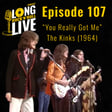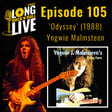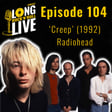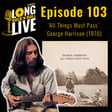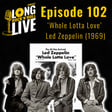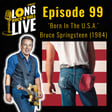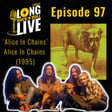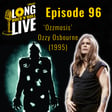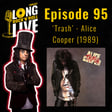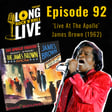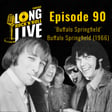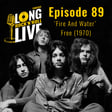Become a Creator today!Start creating today - Share your story with the world!
Start for free
00:00:00
00:00:01

60. 'Hysteria' - Def Leppard (1987)
‘Rock’s Run Riot’
Following Rick Allen’s loss of his left arm after a car accident, Def Leppard’s follow up to their momentous ‘Pyromania’ was a long process. Beginning in 1984 and ending in 1987, ‘Hysteria’ took 3 years and several producers to complete!
The band set out to make a Rock version of Michael Jackson’s ‘Thriller’ - hoping every song could be a hit single. This goal came to fruition when Leppard released SEVEN of the twelve tracks from the album over an 18 month period and, subsequently, sold over 20,000,000 copies - 12,000,000 of which coming from the USA.
Glam Metal or Hard Rock? Hair Metal or Pop Rock? Accessible or selling out? Laz & Felipe analyse and discuss Def Leppard’s best selling album!
- Follow the Podcast on Social Media: https://linktr.ee/longlivernrpod
- Get in touch and/or leave us a review: longliverocknrollpodcast@gmail.com
- Podcast Music: "Bring The Pain"
- Music provided by https://Slip.stream Free Download/Stream: https://get.slip.stream/2njAKT
- Podcast Art by Ross Davidson (@ross_feelshame)
LONG LIVE ROCK ‘N’ ROLL
Transcript
Introduction to the Episode
00:00:12
Speaker
Hello and welcome back to another long live Rock and Roll Podcast episode with your host, Lasmike Glee, who's on this side and on the other side of the screen, Mr Felipe Amorim. How you doing, bro? Doing great, Ben. Hello, everyone. How you doing, brother? Good, very well. It's good. I mean, I think the audience is, the YouTube audiences will notice our backgrounds. Look at them. Yeah, we're like more professional now. Yeah, we're trying to shake. With the album cover and all that stuff. That's it. And look at my mic right in front of me. We're shaking things up a bit. We're trying to, yeah.
Enhancements in Podcast Production
00:00:40
Speaker
Yeah, we're taking this, not that we weren't taking it seriously before, that we are full on now, yeah, so expect some nice new visual and hopefully aural changes in the next few weeks as well. Exactly, we've invested a few million pounds on technology and... Yeah, we had the budget to make an album, but we thought, fuck it, we'll just make our screens look better.
00:01:01
Speaker
get better cameras and everything. But yeah, anyway, here we are back with another episode of the Long Live Rock and Roll Podcast. So before we crack on, make sure you like, subscribe and do all the normal stuff on social media or on YouTube, Instagram, Facebook, all of that stuff. Give us a like, a comment and it will help us indefinitely. So thanks for that.
00:01:19
Speaker
I'll download a few episodes as well, isn't it? Yeah, Felipe's found the hack. Our numbers go up if you download each of our episodes. Even if you've listened, even if you've listened, downloading one does our numbers. So yeah, download the ones you're not going to listen to as well.
00:01:34
Speaker
Why not? Why not? It helps us. There we
Def Leppard's 'Hysteria': Release and Recording
00:01:37
Speaker
go. So this week we are doing an album that I actually chose and we are doing Hysteria by Def Leppard. So some quick facts. It was released 3rd of August 1987, recorded between February 1984 and January 1987. That is a long record time.
00:01:55
Speaker
recorded across Netherlands, Dublin and Paris. It lasts two minutes over one hour, the label was Phonogram and the genres, again another topic which I'm sure we'll get into, we've got glam metal, hard rock and pop rock are the genres loosely associated with it, produced by Robert John Lange who had the nickname Mutt and this is the crazy part, seven singles from the album
00:02:19
Speaker
Animal, Women, Pour Some Sugar, Hysteria, Armageddon It, Love Bites, and Rocket. Let's just go straight into that, man. Seven singles. Seven singles, right? Seven singles. Let me just quickly say the dates they were released, okay? July 87, August 87, September 87, November 87, March 88, July 88, and January 1989. So over the course of 18 months, seven singles from one album.
00:02:49
Speaker
That's, that's kind of crazy. That is crazy. And I mean, that that's not the only ridiculous number of your album.
Album Sales and Production Costs
00:02:58
Speaker
So this, you know, was that fourth album, so they were like success for the time, but he sold 20 million copies worldwide. 12 million in America alone. And
00:03:11
Speaker
It charted at number one on the Billboard 200 and the UK Albums chart. The other interesting thing is it cost a total of £5 million in production, which was a lot of money at the time. I remember them saying they had to sell five million copies to break even. Just to break even. Exactly. So that was a lot of money. If they didn't sell,
00:03:40
Speaker
That would be a big, big problem with the label, but he sold a lot more than that. Before we start the recording, we're talking about the producer, and he just mentioned his name, Matt Lange. He is a big part of the success of the album, isn't he?
00:04:00
Speaker
I think it's like he was writing songs with the band and helping with the production. He even left the production for a while to do the album with the cast, I guess. And then he came back and finished the album with them. And there are loads of reasons why he took that
Producer Changes During Creation
00:04:17
Speaker
long to
00:04:17
Speaker
to finish, isn't it? Yeah, so just a bit of background. It was, as I mentioned, the recording times, it was a three-year process to record, execute, and produce this album. In 1984, Mutt Lange pulled out of producing. The album was actually titled, the working title was called Animal Instinct. They actually left hysteria until later, and they actually, they were going to go with Animal Instinct. He was replaced by Jim Steinman, who we know produced Bat Out of Hell, and you wanted to talk about him a little bit, didn't you?
00:04:48
Speaker
Yeah, because he didn't actually produce Battle of Hell, or he didn't do sound engineering part of the mixing of it. They wanted someone who was capable of mixing and mastering and doing and getting the sound they wanted. And he was more like a songwriter for Meatloaf, other than
00:05:04
Speaker
the producer. Yes, you're right. That was the issue they had with him, because he wouldn't be technical enough. They wanted someone to go to be more technical. He was more artistic. And so they were not happy with him. So they had to let him go. Yeah, they clashed. They clashed a bit, didn't they, over some songwriting, you know, so he left.
00:05:24
Speaker
Jim Steinman, essentially what he did is he wanted a more theatrical and polished, pristine album. I think theatrical is the best word, you know, if you've just come from doing an album with Meatloaf, you could have wanted something a little theatrical. So he was ousted from the project with the drums and bass only done roughly on seven songs. So after three months of production, isn't it? They only had bass and drums for a few songs.
00:05:54
Speaker
So it was a long process, things weren't going well. The first producer left, Jim Steinman came in. And then, to make things worse, in New Year's Eve 1984, Rick Allen lost his arm in a car accident.
Rick Allen's Adaptation to New Drumming
00:06:09
Speaker
Um, now do you want to talk about Rick Allen? Yeah. Yeah. So this is a drama with one arm. That's pretty special. Exactly. Yeah. It's really, really special. It's amazing. Also like, it's one of those stories in Rock and Roll that's been told a million times. So I don't want to like, just add to that, like, and basically just say the same stuff that everyone has said. So the interesting thing is, yeah, he lost his arm. Everyone knows about that story. His most famous story really, um,
00:06:38
Speaker
related to Def Leppard. And drummers. And drummers in general. Yeah, exactly. And it's remarkable how he kept going and finished the album. It's not like, you know, they had a longer break and started something new. I think they were already working on the album and they had to adapt the whole drum kit. So basically, you can find, anyone can find this on YouTube. There's videos of his drum tech explaining how the kit works.
00:07:07
Speaker
And it's, well, completely different than a normal acoustic drum kit. It's mainly electric and it's like he's got loads of triggers, which means like he's got pedals. When he steps on the pedal, you have the floor tom sound or the snare sound.
00:07:23
Speaker
It's much more electronic, isn't it? It's much more electronic. I think it's got about six pedals or something like that. For people who don't know about triggers, if the pedal even slightly touches the skin, the electronic trigger is activated. And even if he just touches it timely, a big snare sound could hit.
00:07:41
Speaker
Yeah, you can also have no different levels, etc. But basically, yeah, when you when it touched the pedal, or the pad, what you're going to have is a pre recorded sound that's going to be triggered by the pedal or the drumstick. So basically had to do that to replace everything he was doing with his left arm. So his left arm was based mainly replaced by the motions he was doing with his left foot on the pedal. So like, basically had to relearn how to play drums from scratch, which is
00:08:10
Speaker
which is insane. And the drums are a big part of
Unique Sound and Production Techniques
00:08:16
Speaker
the album. I think the sound of the album is so like
00:08:20
Speaker
a rock stadium. Yeah, exactly. And they have what we call the big drum sound, which is when you record drums in a big room, there's loads of reverb. You can either do that in a big room, or you can just add that as an effect as post production. But they they had this massive drum sound, some of it electronic, some of it acoustic. And I think the drums are like, essential to to the sound of the album. And they probably
00:08:48
Speaker
uh the most remarkable part of the arrangement and it's all very simple in a certain way it's all very groovy which reminds me a lot of acdc so you know it's about keeping the beat but it's phenomenal drum sound throughout the album it sounds a bit old when you listen to it now sounds a bit too 80s yeah but yeah that was one of my my biggest complaints about the album i mean you'll hear my my opinion on at the end obviously but um it
00:09:16
Speaker
My issue was is that I don't feel it ever really finds a home. I don't ever really feel, you know, it's so obviously influenced by the glam metal that has come in years before. Yeah. At the same time, it's got that big stadium rock sound, but it's got pop music, choruses and melodies. And so I find it, I struggle to, and listen, I'm the first person that when we do all these episodes and you hear me say, oh, they've blended this genre with that genre.
00:09:46
Speaker
I appreciate it and I really will sort of give credit where it's due. But for me, it just never felt like it really found a home. It was too poppy in places. It was not heavy enough in others. It was like a bit too stadium rock in other places. And I think
00:10:02
Speaker
the long three-year recording process was probably a factor in that, because how can you keep a vibe and an attitude and a form of expression going for three years? I mean, think how much your taste in, let's say movies, your taste in movies, you might fancy watching horror movies for six months, and then you're going to go on to some dramas for another six months and some more movies. If that's how simple things like our taste in music, movies, and comic books work,
00:10:30
Speaker
How are emotions going to be? Because emotions are forever changing. And if you're writing songs over those years and all those years, your life is changing in many ways. I mean, the whole, what word am I looking for? The whole
00:10:49
Speaker
a bed of glam metal changed so drastically in between
Evolution of Glam Metal (1984-1987)
00:10:56
Speaker
1984 and 1987 and I'm using glam metal because I know people will probably call this pop rock hard rock glam rock even but deaf leopard it's important to know that
00:11:09
Speaker
Def Leppard's first two albums had traditional heavy metal elements, you know, so you know, your dual lead guitars and just sort of in the production as well. Sometimes it was quite dark to listen to. Pyromania, the album before this, had traces of traditional heavy metal, but the kind of the glam feeling was coming in now. Glam Metal,
00:11:29
Speaker
took over the focus of heavy metal as a broad big genre like jazz or classical music or rock music heavy metal as a genre the focus went over to America in 1983 because glam was taken over MTV were were playing all the videos and everything.
00:11:48
Speaker
And it was born and died very quickly. It sort of came over in 1983 when sort of bands like Judas Priest and Death Leopard brought it over from England, brought the heavy metal over from England and showed what you could do. You had lots of stuff going on in the underground scene of heavy metal, thrash, death metal, but glam was the forefront. And very quickly,
00:12:11
Speaker
By 1987, we had Guns N' Roses, who were overseeing the change from the bright spandex, crazy hair, wild makeup. That was glam metal. They took it towards dirty hair metal, where you lost the outfits, you lost the pizzazz, the makeup and everything, and people started taking it more seriously. More about the music than the video. Yes, because people started
00:12:36
Speaker
taking glam, not seriously. People saying, my God, look at these losers. And this is a three or four year period. So people like Guns N' Roses then came in and started saying, well, we're gonna dress normally. We're still gonna make glammy kind of music, but we're gonna take ourselves more seriously. And in those three years, the whole network of glam metal has changed. And Def Leppard have gone from preparing to record an album, to losing a producer, to losing another producer, to the drummer losing an arm,
00:13:05
Speaker
to having to re-record parts again. And I just think it must have been a crazy process. Well, what I think is, what are the odds of coming out of all that madness and chaos with a decent album? Just coming out of that with an album that sounds acceptable would be a miracle. So what they did is insane.
00:13:33
Speaker
With everything in the music scene changing over the years, and with all the personal traumas and all the delays they had, chances are you're going to have a really, really bad album at the end of that. But I think- The likelihood, yeah. Yeah, yeah.
00:13:49
Speaker
I think the producer plays a big role in that. I think the fact that he managed to find the sound that we're looking for. They said something about him. Mutt, isn't it? They said that he wouldn't accept an okay song. So they came up with something like, oh, check the song out. And it would be like, well,
00:14:14
Speaker
The vocals are great, but everything else is just average. So we're going to make it we're going to walk around the vocals and make everything else as great as the vocals. So he was famous for saying this is OK, but we're not doing OK. Everything has to be great. Every single song. And he came up with a concept of seven singles. So we're going to have seven singles out of
Pop Influences and Ambition for a 'Rock Thriller'
00:14:36
Speaker
this album is going to be the the hard rock version of Thriller. So Thriller was, you know, a big hit.
00:14:44
Speaker
big commercial success by Michael Jackson. He wanted to bring that concept from pop music to rock. You can even claim that this album is more pop than rock. But what makes it rock for me is the amount of guitars. They like endless layers of guitars. And that's another concept they came up with, which is like we don't have a lead and rhythm guitar. Most band with true guitar players have one guy playing rhythm, the other guy doing solos and
00:15:11
Speaker
and riffs and what we call the lead guitar. And they wanted to be like an orchestra. They wanted the guitars to work with voicings and arrangements, not like there's two different melodies going on on guitars, not rhythm and lead. That's a really, really clever thing. And that's one of the best parts of the album, I guess. And that's a characteristic that they brought over from their heavy metal roots. You don't really have a lead and a rhythm in heavy metal.
00:15:39
Speaker
I think if you look at bands like Iron Maiden and Metallica, yes, they have lead guitarists who take the solos, but the quality, you've got to be as proficient playing the lead parts as you've got to be on the rhythm parts as well. But yeah, you know, I think that's an important thing, what you said about what they set out to make a rock version of Thriller. And I wonder how much
00:16:02
Speaker
influence they actually took from the pop side of Michael Jackson, because even one of the songs, which one is it? Hysteria. I thought even towards the end where the voices, they're doing like a little call and response thing. And that sounds like Michael Jackson backing vocals. Don't you think? Yeah, it does. It does. I actually want to ask you if you can hear the influences in there. Like obviously you have the pop stuff like Michael Jackson. You can say that's even part of it. But
00:16:32
Speaker
Apparently, they were looking for a perfect mix of Queen and ACDC. Does that make sense to you? Well, that's really funny you say that because when I was thinking of describing it, I'll just listen, I'll just say it now, you hear it in my monologue.
00:16:49
Speaker
I didn't really enjoy the album, but my job on this on this podcast is to give an unbiased objective. Was it subjective? Whichever one objective, objective view. Yeah, there we go. An objective, unbiased view. So that's my job. And that's what I'm always here to do. But I kind of felt like, you know, I listened to the elements from the first three albums. And it's funny you mentioned Queen because Queen had that moment where they kind of changed and went from rock
00:17:17
Speaker
from being a rock band to a pop band, where synthesizers and keyboards became more prominent. And funnily enough, we spoke about it when we spoke about it in the Genesis episode. Genesis did the same thing. They were like a prog rock band through much of the 70s, and I don't know if I'm wrong, and into the 80s. And then by the 90s, Genesis were like a pop band. You can say the same about Fleetwood Mac. They were more like a blues rock band. Absolutely. So this has happened before.
00:17:47
Speaker
And I think, I don't want to say they're chasing fame and money, but you go which way the market dictates. And with the rise of glam, put it this way, I'll sum up my opinion by something that you said, I don't know if we said it before we started recording or now, during the recording, but to me, the album feels outdated.
00:18:13
Speaker
It's got elements of glam that sort of became a bit stale by 85, 86. It's got some heavy metal in there. I think it could have done with more. I'm biased on the metal head. And it's got pop in there, lots of choruses and melodies.
00:18:28
Speaker
It felt like if this album had come in 1984, when they intended originally to have it, you could look at this and say, wow, like glam metal album of the decade. It would kind of belong to that year. Maybe more, but yeah. Can I just say quickly, when you think that the same year this was released, we got appetite for destruction. To me, it just feels like they were just late to the party.
00:18:57
Speaker
And I don't say that critically. But still they sold a lot. So that means people were still up to listen to that kind of music. Absolutely. And who am I? You know, all I'm doing is giving my opinion. Who am I to say they should have done this or done that? But that is just my opinion. But I think it's just funny because it slots so perfectly musically and with like a 1983 or 1984 Klam Metal album.
00:19:18
Speaker
and I don't feel like it slots in historically with something like appetite for destruction which was just a bit more mature took itself a little more seriously but that's just an observation you know it was released whenever it was released there was no one any there's nothing anyone could do about that but to take it back to production I have to say that is a fantastic part of it because every song
00:19:42
Speaker
The instruments are just crystal clear and the effects on it, it is perfectly produced, do you agree?
Intricate Production: The Mutt-Lange Method
00:19:49
Speaker
Yeah, it is. And they are they have at some points four to eight guitar tracks running at the same time. Yeah. And for me, it doesn't sound like too much. I usually don't like more than like three, four guitars at the same time. Sometimes they have way more than that. And it just works because I think the the best choices they've made in every song is the use of spaces.
00:20:14
Speaker
And they talk about it a lot when you see any interviews you see with the band when you're talking about it, like they say that like, or some sugar on me, that song, they wanted the backbeat which that snare on beats two and four that we hear is where we're
00:20:30
Speaker
you know, when people are supposed to clap their hands with the song, which doesn't necessarily happen. Some people clap one and three. But basically, every time they play in the riff, there's they leave a space for the backbeat for this ne'er drum to kind of sound louder because there's nothing getting in the way. So here's a tricky thing about production that they did. They did loads and loads of layers and tracks. But
00:20:58
Speaker
nothing gets in the way of the melody and the groove. That is really, really hard to achieve. I think that's one of the things. One thing I want to say about trying to catch up with The Times for me is, again, pour some sugar on me, was heavily inspired by that partnership of Aerosmith and Run DMC. I really want to walk this way. Yeah, because of the vocals. Maybe they want the vocals to be a bit like rap music. That's what I wanted.
00:21:27
Speaker
I was going to say just a reminder that any song we mention will be in the dedicated playlist that we make, which is in the show notes below. So check out the show notes, find the link whenever we mention a song. If you haven't heard it, you can go along and check it out.
00:21:41
Speaker
But yeah, yes, sorry, Felipe Caro and the elaborate. So they were trying, I think they were trying to not sound like what we're still in 1984. So they were listening to whatever was going on on MTV and all that stuff. And they they've heard Run DMC playing with Aerosmith doing their version of Walk This Way. And they thought, you know, well, we can do something like that. So that's why some of the vocals are more like
00:22:05
Speaker
spoken and everything. But one thing that I noticed as well, you might have noticed this, there's not a single fast song in the album. They're actually medium slow tempos, which might be one of the reasons why the album kind of flows.
00:22:20
Speaker
And if the songs feel connected... Sorry, we spoke about this last week. For listeners and viewers, last week we spoke about Frampton Comes Alive and we spoke about how the concert was fantastic and it never took a dip because they didn't start with a high speed song and then go slow. All the songs kind of sit at the same tempo, so the energy just stays. And it's the same as you're saying with this album, isn't it?
00:22:45
Speaker
Yeah, it is. And some, I think, if we can talk about the songs, like specifically, I think, yeah, I think I like when the first song actually sets the tone for the album. And it's quite understated, isn't it? For a heavy rock song. Yeah, it's not in your face. Whenever I think heavy rock song opening track, I think Highway Star. And I know we're 15 years later, but it's still, you know, an understated. Yeah, I wouldn't listen to when you listen to
00:23:15
Speaker
to listen to women, isn't it, the first one? Yes, it is, yeah. Yeah, you have, I mean, it's very 80s, the overall sound and it looks like big drums, loads of reverb, loads of space, and the repetitive riff. Yeah, on the repetitive riff, which is not a bad thing, once they're repetitive, it's just like, it just loops itself all the time. As low tempo, strong BVs, like they're really, really loud in the mix, they're really
00:23:45
Speaker
I just add to that, atmospheric. I thought the production was brilliant. The atmosphere created by the sound effects and the little embellishments they were putting in the production was lovely. Yeah. And I think the guitar solos, they've made really melodic choices for the solo. So there's no, as we usually say in the show, no guitar wanky vibes. No wanky guitars.
00:24:09
Speaker
no wanky guitars. It's just like, whatever the song needs, the solos are not long. Some of the songs are long because that's the concept of that time. We just repeat the chorus over and over and never ends. And they have that really, really slow fade out that actually almost never happens. It's just like, well, is it the end or not? But that happens throughout the album. But basically,
00:24:32
Speaker
The short solos, more melodic approach to the guitar playing, I think that's one of the things they did really well. I think there's not much ego in that kind of stuff. I think what they wanted is to be recognized as good songwriters and arrangers and a good band rather than individual talent. And I think that that's very clear in the way the album sounds.
00:24:56
Speaker
Yeah, well, those kind of characteristics of wanting to be a good band, they come through the execution of songwriting, you know, songs on an album, isn't it? That's how you prove it.
Track Analysis: 'Animal' and Catchy Choruses
00:25:07
Speaker
I liked the track Animal Track 3. I really enjoyed the chorus of that. That's an example of the catchy kind of pre-chorus and chorus that we get throughout the album. And although we might have sort of sections where it feels a bit, what word can I use?
00:25:25
Speaker
Rocky, it feels a bit rock. We're venturing from pop into rock and you might find that the vocals are more expressive. Maybe he's talking more or shouting as opposed to like singing a nice clean line. But then you kind of forget all of that the moment the pre-chorus and the chorus comes in. Because once you've heard some of these choruses in this album, they're stuck in your head all day, don't you think? Yeah, it's so catchy.
00:25:52
Speaker
I dare you guys to try and get them out of your head. Yeah, and also, some of the lyrics, they are the kind of material that Spinal Tap was mocking, isn't it?
00:26:03
Speaker
It's like it's that kind of stuff. That's why it's called lick my love. That could be one of their lyrics would be just perfect. Yeah, I'm not quite sure about it. But maybe spinal tap was highly influenced by them. You never know because yeah, it's that kind of so maybe the lyrics and maybe some of the sounds they like
00:26:26
Speaker
too much 80s for my taste. But I don't think there's anything bad about it. It's just like it reflects the time when the recording started rather than when it was released. But still,
00:26:44
Speaker
Still, there's an artistic value to everything they did because they were so careful. This idea of never accepting an average result and aiming for high quality in everything.
00:26:57
Speaker
It can really be noticed throughout the whole album. If you listen to every song and every bar, there's nothing meaningless in there. And I think there was such a massive sense of unity within this band on the playing of the album.
00:27:17
Speaker
You can hear they're tight. And when we think glam metal, for me, my mind, I'm very linear with things. I like to, I have things organized categorically in my head. So when I hear the words glam metal, my first thought is 1978 Van Halen one. We've done that episode before. We've done the album so for new viewers and listeners, go back and check out that episode. That was a good one. We enjoyed that one, didn't we? Yeah.
00:27:40
Speaker
I think Van Halen 1 because that was the album that kind of got glam metal going. It showed that you could incorporate accessible poppy backing vocals with accessible melodies and lyrics and easy-going songs with crazy shredding guitar solos, heavy metal rhythms in places and it really showed you could do that and essentially glam metal was born because of that. So when I compare it to the likes of Van Halen 1 it does
00:28:05
Speaker
In some categories, it falls short. It's not as heavy as Van Halen 1. It doesn't have those moments where you think, oh, this is almost a metal song. Although there were metal sections in some of these songs, I've never came away from a song thinking, yeah, that's the heaviest song on the album. But what it does expand on, and what I think you agree with, is the backing vocals on it are just fantastic. So one thing I didn't do was introduce the bands. So I'm going to introduce them, take note of something.
00:28:32
Speaker
Vocals, Joe Elliott. Guitars and backing vocals, Phil Collin. Guitars and backing vocals, Steve Clark. Bass and backing vocals, Rick Savage. Drums and backing vocals, Rick Allen. So they're all vocalists, put it that way. They're all vocalists. You can hear it because you throughout the whole album, despite
00:28:50
Speaker
my opinion, your opinion, his opinion, how poppy it might be, how accessible, you have got some stunning harmonic work there with the vocals beautifully layered to represent the chord that they want to sing in a really lovely way. It works, isn't it? With excessive levels of reverb as well, yeah, yeah, yeah.
00:29:15
Speaker
but yeah that's I mean but throughout nearly every song isn't it just backing vocal galore yeah it is it is and yeah I think they kind of maybe that's why the drums and the bass are so simple when I say simple I never mean that they are
00:29:32
Speaker
easy to play or anything like that. But they're simple parts. They keep the groove going because the guitars are doing different stuff every time and the vocals. Basically, there's too many tracks of guitars and vocals all the time. So drums and bass, they are really the foundation, which is normally what it is supposed to be. But when you have a metal, sometimes you might have some over playing on the bass and drums and it works.
00:29:57
Speaker
But that's one of the things that make this album less heavy metal, more pop or hard rock or glam, whatever you want to call it, is the groove is more simple and solid. All the excessive amount of stuff going on comes from guitars and vocals. There's an interesting story about Love Bites, which is another huge hit from the album. Phil Collings said they had so many guitar parts in it,
00:30:27
Speaker
and they never actually played it together as a band rehearsing so it was a pure studio song so they did layer by layer adding stuff and the song made it to number one and what I think was their first number one on the in Vancouver in Canada like getting ready to
00:30:46
Speaker
to play or getting ready for the tour. They're like, well, we kind of have to learn this song. Because they had to make a lot of choices to decide what to play live. If you have 15 guitars and a song, which parts are you going to play? Which parts are you going to drop to make it sound as close as possible to the original version? So they booked a studio and they rehearsed that song for two days.
00:31:13
Speaker
Because they were ready for the gig, but not for that song. The song made it to number one. They're like, well, what the hell do we do now? We can't play our own song. Which is similar to what happened to Queen with Bohemian Rhapsody, wasn't it? Now we need to learn this thing. It's really complicated. And then they just said, fuck it, with that opera part, we'll just leave it. We'll just play it on track.
00:31:35
Speaker
One thing I wanted to draw attention to that you've just mentioned was some of the production effects and sorry not effects, production techniques. Now there's something here that I was reading called the MAT.
00:31:47
Speaker
Sorry, the Mutt-Lange method. Did you read about this? No. Right. So check this out. Okay. The Mutt-Lange method included this. So Felipe just mentioned about stacking up layers of 15 guitars or whatever. In this album, this is how extensive and how deep they went. Mutt-Lange would get them to tune one string of the guitar. Okay.
00:32:14
Speaker
and they play the note and record it. So imagine you're playing a G chord. For non-musical listeners, a G chord contains the notes G, B and D, all right? G major. They tune one of the strings to G and they play the rhythm. Right, next let's find a B. Is that a B? Is that one string at a time? Is that a B? Is that perfect? Yeah.
00:32:43
Speaker
Great recorded. D, string by string. Can you believe they build the chord one string at a time? Perfectly tuned.
00:32:55
Speaker
So yeah, I read about it and I thought it was like, this card, I thought it was a joke. I followed up and it is apparently true, yeah. And what that does is provides an incredible level of detail, technicality, I think with bands, you know, let's think about bands we've mentioned, and within their first four albums, Queen, ACDC. I think those bands, at this point of their career,
00:33:24
Speaker
had the attitude, the vibe, the rock and rollness to not care so much about the tuning of a guitar. Obviously if they could they would make sure it's in tune without a doubt, but if something went wrong and that was the only take they got they wouldn't have scrapped the whole song and said we need to start again because this is out of tune. Sometimes there is a bit of musical freedom with notes being slightly out of tune. I can't say there's any
00:33:52
Speaker
any one song I know by a famous rock band where, oh, that's that note's out of tune. But there is a little looseness, a little rock and rollness with bands who just play it a bit loose, a bit easy. But this is another level of detail, isn't it? Yeah, it's this like no stream. But I think in music production and songwriting, perfectionism pays off.
00:34:16
Speaker
Well, I think yeah, you know, and you might think that that belongs that kind of approach belongs to classical music or prog rock or jazz or anything that's like, you know, complicated and stuff. But you can you can do cheesy
00:34:32
Speaker
pop songs for the radio and for the masses with a high level of creativity, production and detail. And I think maybe that's the best. Maybe if I have to say what I like the most about the album is this attention to detail. Well, everything is there with the reason, isn't it? There is nothing there that is not
00:34:57
Speaker
meant to be there, you know. Is there anything, any other songs you wanted to mention or specific aspects? I mean, personally, in terms of catchy choruses, I really loved Armageddon It, Don't Shoot Shotgun, thought that was good. The Hysteria song. Armageddon It was my favorite opening riff, for sure. Yeah, I think I'd agree. Yeah, I think Armageddon It is, for me, is if ACDC was a pop band, that would be it.
00:35:25
Speaker
That's a fair comparison. I actually listened to the first song of their last album just for a bit of comparison. I thought that was quite ACDC-esque as well. Just kind of like very simple drums and bass, a guitar, just playing simple chords going on with a nice melody and a nice hook.
00:35:40
Speaker
I think if you have some classic stuff. Well, Travolta is like, Pour Some Sugar On Me is one of my favourites. I think the drum beat and the chorus, and I've played that song live with a pop band once. It is the definition of a classic rock song. Yes, you get everyone singing along, and people are like, oh yeah, that song, right? And they sing along with it. That beat, an anthemic chorus, it's by everything, isn't it?
00:36:07
Speaker
Yeah, I don't know if that would be my favorite love bites is great. But I think I think Armageddon is my favorite for you know, it's just, it's just so silly in a good way. You know, I actually did like the big surprise for me was run riot. Because that is the closest they got to punk.
00:36:28
Speaker
and metal as well, I put in that sentence, because then in the bridge, he's got that quite dark, heavy metal riff. Yeah. But yeah, it's the darkest one in the album, probably the heaviest, I don't know, the most distorted. Yeah, you know, yeah. So that's a that's a good surprise. You know, that's a good surprise. That was probably my second favourite, don't say. Yeah. Yeah.
Reception and Impact of 'Hysteria'
00:36:50
Speaker
As an album, I think I like
00:36:52
Speaker
I like it. I didn't fall in love with the album. I didn't know this album. I knew some of the singles and I'm not familiar with Def Leppard for some reason. I should be. They're such a huge band. This is my first introduction to Def Leppard. Obviously, I've heard them. I've heard the hits.
00:37:13
Speaker
But in terms of doing a full-on, this is my first one as well. Yes, the first time I've listened to one of the albums to start to finish. And it surprised me the overall quality. And again, we said this about most of the albums we picked. There's no fillers in that sense. I mean, I think it's, yeah, it's not, you might, yeah, from my taste, there's nothing exceptional for the kind of stuff I like listening to. But
00:37:39
Speaker
putting into context the songs, the fact that you have seven singles in an album, whether you like them or whether you like this kind of music or not, the songs are all of the same quality.
00:37:53
Speaker
were quite brave to come from a heavy metal album into this. That could have been the end of their career and they had the opposite effect. And it's lucky, man, because, you know, like I said, Glam was dying out and people were kind of not taking it so seriously anymore. They got him right at the end, you know, just before sort of
00:38:16
Speaker
Glam would have a few more years, but like I said, towards the end of the 80s, Glam started changing from being all glammy and weird to a bit more serious, like dirty hair metal bands like Skid Row, Guns N' Roses, you know.
00:38:31
Speaker
But yeah, so now I just wanted to talk about the significance of the album and what generally the consensus is on why it's so good. So I've got a few reasons here. One thing I haven't mentioned that I'll touch on now is the music videos, because the music videos for these songs, I've only seen a few of them, but generally they're just visually striking. I think about Pause and Sugar on Me and Love Bites, you know, these were released in conjunction with the rise of MTV.
00:38:55
Speaker
or maybe not the right, maybe it was already established by then. But music videos were becoming important things and Def Leppard definitely nailed the music videos for this album, didn't they? Yeah, yeah. I mean, they had all the elements, all the extravaganza of the 80s. And it's like their music
00:39:18
Speaker
It's quite visual if that makes any sense. We listen to it. It's like I can hear the colors. I can visualize what the music video would be if I was listening to pour some sugar on me. Exactly.
00:39:36
Speaker
So we've already mentioned the critical success or the economic success in terms of 20 million albums sold, 12 million in the US alone. Let's just think about that for a second. 12 million albums sold in the US by a UK band.
00:39:54
Speaker
That's something, isn't it? That's pretty nuts. Now, shark success. Check these out, right? Number one in Australia, Finland, Norway, New Zealand, UK and the USA. Number two in Sweden and Switzerland.
00:40:10
Speaker
Across the world. Across the world. Different cultures, different backgrounds. Different New Zealand. Like, wow. Wow. So it's almost like I don't, a deaf leopard fan shouldn't care, and I don't care about my opinion, because you've got to look at that and say they did something right, didn't they?
00:40:29
Speaker
like you know whether I like it or not for a guy with a slayer t-shirt last for people who are only listening he's wearing a slayer t-shirt for a guy wearing a slayer to
00:40:41
Speaker
to praise their leopard. What an achievement. They were under huge pressure because they did a great album and they could have just done more of the same and they went in a different direction. That's brave and I think that's what Rock and Roll is all about.
00:41:02
Speaker
This is what we believe is going to be the next big thing and we want to do it and we want to make it as good as possible. If we need to sack the producer and get the other guy back, we're going to do this, do that and keep working on the songs. And if you write a song right at the end of the process and you're about to finish the album, but we've got one new good song, we're going to do it. Yeah. And they did all of that. So yeah, it takes a lot.
00:41:30
Speaker
To have your roots in a certain kind of music, you know, we know Def Leppard came from the heavy metal kind of background slash hard rock.
00:41:40
Speaker
They basically sacrificed those elements of their music in this album, didn't they? I feel like that. I feel like they said, right, we're not going to do metal riffs anymore. We're not going to go ultra hard rock on the production riffs and rhythms. We're going to swap those in. And I think, like you said, this is actually a good comparison to Fleetwood Mac, who did the same thing with the Rumours album, which again, we've done a video on, so go back and check that one out. Yeah, the one thing I don't understand
00:42:08
Speaker
when people get really, really frustrated. Oh, the band has changed. And oh, you know, they're doing something different now. I don't like it. I prefer the other album. It's like the other album is still there. Go and listen to it. Yeah. When the band changes completely. Imagine. So just, you know, if you want to, I'll give those people a good strategy for that kind of stuff to make you feel better. Imagine that the band you love,
00:42:34
Speaker
they decided to split after the album you love the most and they do they no longer exist. That's it. So you listen to everything that's been produced until that point and you can know everything that comes after that just pretends another band is a new pop band. Yeah, that's how you do have to listen to it. So well, I actually I I'm I welcome every sort of of experimentation and and and
00:43:00
Speaker
and changes that any band can do. Even if they go in a direction that doesn't quite work or I don't like, it's like, whoa, at least people are trying to do something different. I think that's rock and roll, isn't it? Rock and roll is like, go there and do whatever you feel like you should do. Not what your label's telling you to do, not what your own fans are telling you to do. We're trying to sneak it into every episode, but I will reiterate the long live rock and roll podcast motto, which is rock and roll is musical freedom.
00:43:27
Speaker
and we've seen a band experiment with their freedom here, so why the hell not? One thing, one other category of significance I thought was important was the cultural impact because it definitely, although to some people like me it might sound a bit outdated, it definitely holds the cultural significance that the early 80s had
00:43:52
Speaker
the outfits, the big hair, the anthemic choruses, the kind of over the top production and polishedness of it. It does sort of really significantly represent the 80s. And I think that's a nice thing because like you said, they started the album in 84 and they didn't release it to 87.
00:44:12
Speaker
There's going to be things from three years earlier that we're in, but it's still worth keeping in. Still doesn't beat Chinese democracy, does it? No, no, no, exactly. How long was the Guns N' Roses album? Was it like 13 years in the make? Something crazy. A billion dollars? Did I get that out of nowhere? Is there a billion?
00:44:29
Speaker
can't be if something crazy isn't it some crazy yeah and it took like yeah it took over a decade and it's like it's not that great my opinion it's good it's not that great i mean it's like if someone tells me i'm going to tell you the funniest joke ever and they tell me after 10 years and it's not it's just like kind of funny yeah and then i'm going to be really disappointed that's it but you know three years and yeah what yeah 13 million so not and not anywhere close to a billion and how many years in the make
00:45:03
Speaker
How did it take to make? So 14 years. 14 years. One million a year. So, compared to Chinese democracy, hysteria was kind of okay. Only three years. Come on, it's not that long. Also, you got to understand a car crash in the middle. That's the last part I was going to bring to which I want to ask you about and talk to you about the resilience
Resilience Through Challenges
00:45:26
Speaker
the strength, the emotional courage it takes for a band. I mean, it's not a small deal that the drummer has lost his arm. It's a big, big hit when a band's producer leaves because you've gone in with an idea, you know, you can attest this, we've been in the studio together professionally.
00:45:49
Speaker
You've gone in with an idea in mind of how the band and how this specific producer is going to help you tailor your sound, record your instruments to get the best results. To have Mark Lange leave, that's a big enough issue. To have Jim Steinman come in and change how things were supposedly meant to go, that's another big issue. To have that guy leave months later with not much done on the tracks is the third biggest issue.
00:46:17
Speaker
Follow that up with the drummer losing his arm. Yeah, and then you have to pretty much restructure the whole way you record drums because it went from acoustic to electronic. Great point, great point. And you have to change the sound and everything. Yeah, you have to take all of those things into account, into account. Deal with them.
00:46:40
Speaker
Think about the rehabilitation he must have had to go through. All of that over the course of years, whilst the rest of the band are still writing, still thinking what can we do for this album, and then finally when he's back, not to overwork him, to give him the time he needs, but you still want to get to a deadline. I just think it must be...
00:47:00
Speaker
In terms of attitude, massive, massive props to the band, all of them, you know, I'm not saying the other four guys for dealing with Rick's injury, all of them, they all went through what seems they went through so much in those three years. And again, despite my opinions on it, to produce an album as clean and fantastically executed as this is a remarkable achievement, I think. It is, it is. And again, I think a true band,
00:47:29
Speaker
would do what they did which is like let's wait until our drummer is ready and let's carry on, let's rock and roll like this. Music is bigger than the musicians and they want to keep going and get to the end of it and that's amazing.
00:47:44
Speaker
Yeah, so I know we're approaching the end. So yes, go for it. And I know you have a monologue, but I have my own. Yeah, I like that we're making this a regular thing. Let's be the monologue in one second. I'm just going to list some of the accolades. Yeah. We've done the number ones and everything. Just check this out, okay? Yeah. Rock Hard, the magazine. 500 greatest rock and metal albums of all time. They gave this one number 464. Rock Hard's greatest hair metal albums of all time. Number one.
00:48:14
Speaker
Loud Wire's greatest hair metal albums of all time, number two. Metal Rules, top 50 glam metal albums, number 30. It is a very respected album.
00:48:26
Speaker
and I think we've done enough over the last 45 minutes to show that actually it's an album that hasn't wowed you or me.
Felipe Amorim's Positive Reflection
00:48:33
Speaker
We haven't sat there being like, oh, this is the best stuff we've ever heard, but we can sure as hell appreciate what is going on deep in the album, the songwriting, the lyrics, the mix. It's brilliant without me enjoying it. I don't think I've ever said those words.
00:48:48
Speaker
Well, you can appreciate the craft, isn't it? Yeah, absolutely. And I think I really, I'm really glad you suggested this one because I wasn't familiar with any of the albums like starting to finish. This one is so relevant for the history of rock music that it would be a shame if I'd never listened to it. So really cool. Excellent. Let's wrap things up. We're going to start with Felipe's monologue. Okay, here I go. Written and recorded during
00:49:16
Speaker
Turbulent times, Hysteria is a masterpiece from the 80s. It combines elements from every subgenre of rock music that has been produced up to that point in time. Never too heavy, never too fast.
00:49:28
Speaker
The album flows from hit to hit with a good balance between cheesy lyrics, strong vocal harmonies and clever arrangements. Def Lepper gave their incredibly talented producer the freedom of joining them on every step of the journey, writing songs and challenging the band to achieve greatness through hard work and commitment.
00:49:47
Speaker
Personal tragedies and pressure to repeat their previous achievements have added to the chaos that seemed to have forced the band to try harder than ever before, resulting in an extremely successful record that has survived the 80s and found its place in rock history. It's ambitious as a concept, but fun and enjoyable as rock music should be.
00:50:09
Speaker
Brilliant, bro. I love this. I love that we're both doing a monologue now. That's so cool. Yeah, that was lovely, man. Great points. You focused on all the positives of the album. I'm not so good about it. Yeah. Awesome. Shall I do mine now? Yes. Okay.
Lasmike Glee's Critical Perspective
00:50:24
Speaker
To steal and adapt a quote from a character from the US version of The Office, just so I just say the UK version is far superior. But anyway, here's the quote. Everyone knows that.
00:50:36
Speaker
It's rock for those who don't like rock. It's pop for those who don't like pop. And it's metal for those who don't like metal.
00:50:46
Speaker
That's the best way I can describe this album. I don't like it very much, but that's not to say it doesn't have its moments, and it most certainly is a very good album in its own standing. My main issue is that I don't like how equally it sits in its sub-genres. It's too heavy to be a pop album, too accessible and poppy to be a rock album, and far too produced and synthetic to be a metal album.
00:51:08
Speaker
For this reason, I end up only enjoying moments of songs, a chorus here, a heavy riff there, a guitar solo there, because when I come across something I like, it's usually followed by a section that I equally dislike. This album just feels to me like it's in multiple camps, and it doesn't have any real identity, taking some aspects from Glam's recent success, sparsely mixing in elements of their heavier slash metal background, and also then realising that there is money to be made with the appeal and accessibility of pop music.
00:51:36
Speaker
Whilst I usually celebrate when bands mix these styles, I just feel that they've taken the worst parts of each of these sub-genres and stuck them together. Again, just my opinion. However, whilst on this show we are very forthcoming with our opinions and we're not afraid to share them, are we Felipe? The guitar work and musical precision is, sorry, we must also remember that we cannot like every album and I think it's our responsibility to offer an unbiased view.
00:52:03
Speaker
The catchy choruses are very memorable and stick in your head. The guitar work and musical precision is something to be celebrated as the melodic and harmonic work is very good and works fantastically. The backing vocals are exquisitely organized and structured and the production of the whole thing is just top-notch.
00:52:18
Speaker
The patience they must have had in order to face their adverse circumstances is something to praise them for. And to take their time and not rush to prep the recording, the execution of the album is something again we must applaud. To face the news of a drummer losing his arm, producers bowing out of projects is really tough. But to still continue on in the same fashion with a clear vision and goal of what you want to produce and it being considered a massive success by your fans is an admirable feat.
00:52:50
Speaker
Yeah I agree. We've just we've summed the album up into monologues haven't we? I love this you've got to keep doing monologues bro because yeah I love that because we end up getting two sides just like the whole point of this podcast you know we've got two different opinions from two people of different ages different instruments different cultures
00:53:08
Speaker
And it always brings us back. I like to think that my view of most albums is more positive all the time. And I like to think... Fuck yeah, that's rock and roll. I love everything. And Lars is really harsh. Lars is the guy who rewrites Tearway to Heaven because he doesn't like the last bar of the song.
00:53:27
Speaker
I'm going to rewrite all of it, just the end.
Conclusion and Listener Engagement
00:53:31
Speaker
Go back to one of the first three episodes. A friend of mine said that you would fix the Mona Lisa if it could, isn't it? Well, did he say, yeah, do her right eye a little bit higher or something? Anyway, with that, we will bow out for this week. Thank you again for joining us. We have a long live Rock and Roll podcast. We hope you've enjoyed your time with us.
00:53:53
Speaker
As we mentioned, I'll keep it short and quick. Please do all you can to give us a like, a comment, and subscribe on any of the social media stuff you see. Any interaction really helps us be seen by more people on the social media platforms. And if you're listening to us over Spotify or Apple podcasts or Amazon or Google, any review you give us, even if it's one more, they start saying, oh, people have seen this now. They're rating it. Let's move it up the charts.
00:54:19
Speaker
and now instead of having people having searched long live rock and roll to find us, they search rock and roll, they search deaf leopard and then we get shown in the charts and we move up and up and all we want to do is grow. We're an independent podcast, we do this all off our own backs and we do it because we love the music so we hope with that in mind and with this episode that you join us next time. Yeah and if you're listening to this 200 years after it has been recorded so you can find us on the internet, whatever the internet has become.
00:54:47
Speaker
You imagine? That's a conversation for another day. Anyway. Fleefy, that's your cue. That's my cue. He said anyway, and I was meant to say my cue. So keep on rocking it, everyone. Fantastic. It took, what, 58 episodes for you to forget your cue. I'm really proud of you because he is a bit forgettable. I didn't forget the line. I didn't get the cue. That was it. Like, is this the end? Is that it? Am I supposed to say it? Keep on rocking, everyone. I'll say it again.
00:55:16
Speaker
Isn't this what Rock and Roll is about, man? It's about, you know, if you make a mistake live, as we know plenty of times during gigs, you just roll with it, you have a laugh, and you get on with it. But thank you, sir, for your cue. I will end with mine. Take care, guys, and as usual, long live Rock and Roll.
